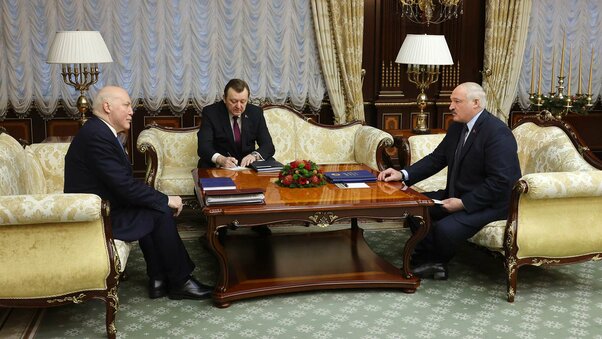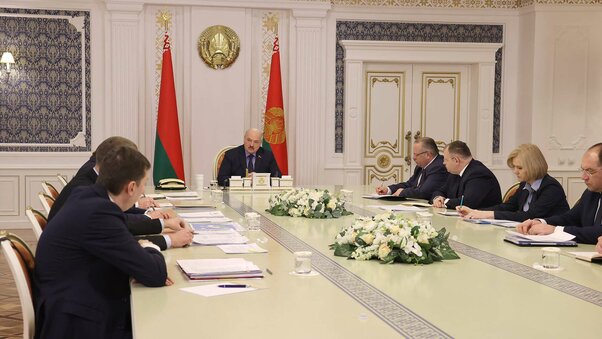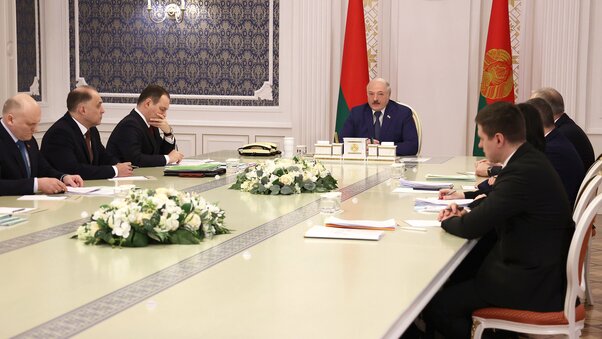Meeting to discuss implementation of Union State sectoral programs
- 11
- 12:32
The implementation of the Belarus-Russia Union State integration programs was in focus of the meeting hosted by Belarusian President Aleksandr Lukashenko on 12 January.
According to Aleksandr Lukashenko, the purpose of the meeting was to discuss the implementation of 28 sectoral programs adopted at the meeting of the Union State Supreme State Council roughly a year ago. “In other words, this is our program of action - for Belarus and Russia - for the coming period. We were in agreement back then that their implementation would significantly propel the efforts to ensure equal rights of individuals and economic entities of the two countries. Equal conditions for people and companies are the foundation for our relations with fraternal Russia. That is why we agreed on many decisions regarding our cooperation with the Russian Federation,” the head of state explained.
According to him, the programs primarily concern economic integration, creation of an environment conducive to cooperation between companies of the two countries.
The programs and departmental plans contain about a thousand activities. These programs have deadlines and specific persons in charge, the President recalled. “About 70% of such activities have already been completed. However, the implementation of some of the important [activities] is lagging behind the agreed schedules. As I am informed, our Russian partners are moving slowly on a number of issues. Yet I always say that we cannot put the blame on just one side. We are also under-performing,” the President said.
According to Aleksandr Lukashenko, a lot of work has been done to create and adjust the legal framework for interstate cooperation. “Yet, despite the implementation of most of the measures, Belarus has not yet seen any noticeable progress, primarily in energy sector, manufacturing, and transport,” he continued. “The implementation of the programs to create common markets for gas, oil and oil products required consideration at the highest level. During the December talks with the President of Russia, the necessary solutions were found (at least for three years). Now work is underway to formalize these arrangements in existing documents,” the President added.
The President emphasized that everything should be transparent when it comes to such important areas of work as harmonization of tax legislation and coordination of tax and customs control on the borders of the Union State. “The Russians are okay with Belarusian representatives inspecting any point of the border to see what is going on there. Traceability, control over commodity flows - you must admit, this is an important matter for any state,” he said.
A proposal to ratify the Treaty on General Principles of Taxation on Indirect Taxes was submitted to the President for consideration. “Before signing the relevant bill into law, I would like to revisit the issues that I have identified (primarily customs and tax legislation), and to make sure that all interests and proposals have been taken on board, first of all, on our part,” the head of state said.
Aleksandr Lukashenko noted that the current version of the treaty provides, among other things, for the creation of an additional interstate supranational tax committee. The head of state questioned the title of the committee and asked for clarification on the matter.
“I emphasize once again that it will not lead to the loss of any part of our sovereignty. Taxes will be calculated and laws will be adopted in Belarus as before,” the head of state said. He recalled that the Tax Code was passed not so long ago. The situation with specific taxes might change in the future: some taxes will be reduced, some will be increased, as it has always happened. “We are independent in our decision-making in this important area; there will be just closer coordination of activities with Russia. And this small structure [supranational tax committee] is being created for coordination,” the head of state explained. According to him, this new structure will be focused primarily on improving the tax legislation of the two countries. The same approaches will be applied to customs administration.
Belarus and Russia are set to implement 28 Union State programs that contain a total of about a thousand events. They were completed by almost 68% (671 out of 989 activities). As of the early 2023, seven programs have been fully implemented. They deal with the traceability of goods, as well as transport, currency, veterinary and phytosanitary control. There are also programs in the financial sector, accounting, and nuclear energy. Work continues on 21 programs, including programs in agriculture, transport, industry, and energy.


